The Companies That Produce the Most CEOs
They’re three ordinary letters that convey a world of power: CEO. But every CEO has their own origin story, some more humble than others.
Still, one thing that has shaped many a CEO — whatever their background — has been a period spent with a big company. A Chief Executive Officer reigns over an entire company, big or small, developing strategies to keep the business profitable and the shareholders, employees and customers happy. They oversee the work of the Chief Operating and Financial Officers and other top decision-makers. As such, they benefit as much from experience and a thorough understanding of how a company and the industry works as they do from their academic accomplishments.
Indeed, just over one-fifth of all CEOs appointed at S&P 1500 companies between 1992 and 2010 came from just 36 companies: so-called CEO factories, where talented, ambitious employees are able to hone their business savvy skills to executive level as they conduct their regular daily work. And while the average time it takes from entering the world of work to becoming a CEO is 24 years, those who get there fastest are characterized by bold career moves rather than glittering academic credentials.
Having previously identified the companies that produce the most founders, OnDeck® can now reveal the organizations from which former employees are most likely to become CEOs. These are today’s CEO factories, presented altogether and in the realms of tech, finance, retail, media and the automotive industry.
What We Did
OnDeck compiled a list of the biggest companies operating in the U.S. and used LinkedIn’s Company Search tool to calculate the percentage of a company’s former employees who now work as CEOs. We then ranked these companies overall and within their respective industries.
Key Findings
- The five companies that produce the most CEOs are all management consulting firms.
- McKinsey & Company produces the most CEOs of all: 7.10% of the company’s former employees have graduated into the role.
- Porsche Cars North America is the automotive company that produces the most CEOs (3.09% of former employees).
- EMI Music is the music industry company that produces the most CEOs (3.87%).
Management Consulting Firms — Including McKinsey — Produce the Most CEOs
Five management consulting firms lead the way among companies producing CEOs. The roles of management consultant and CEO are not as similar as they may seem: while they may draw from the same knowledge pool, there is a big difference between advising and being the person who chooses and executes decisions. And the management consultant is better acquainted with advising persons of power than with managing a diverse range of professionals across a company’s profile.

Click here to see the image in full size
However, former consultants are particularly suited for the role of CEO in times of strife. “Consultants are trained to analyze and address problems, and focus on improving the value of a company over a short time frame — exactly what is needed in many turnaround situations,” according to an HBR conversation with executive search company Spencer Stuart. “They are often adept at connecting the dots between complex sets of issues and crafting phased, comprehensive programs of attack — targeting the initiatives that are most likely to deliver impact.”
Booz Allen Hamilton is the Tech Company That Produces the Most CEOs
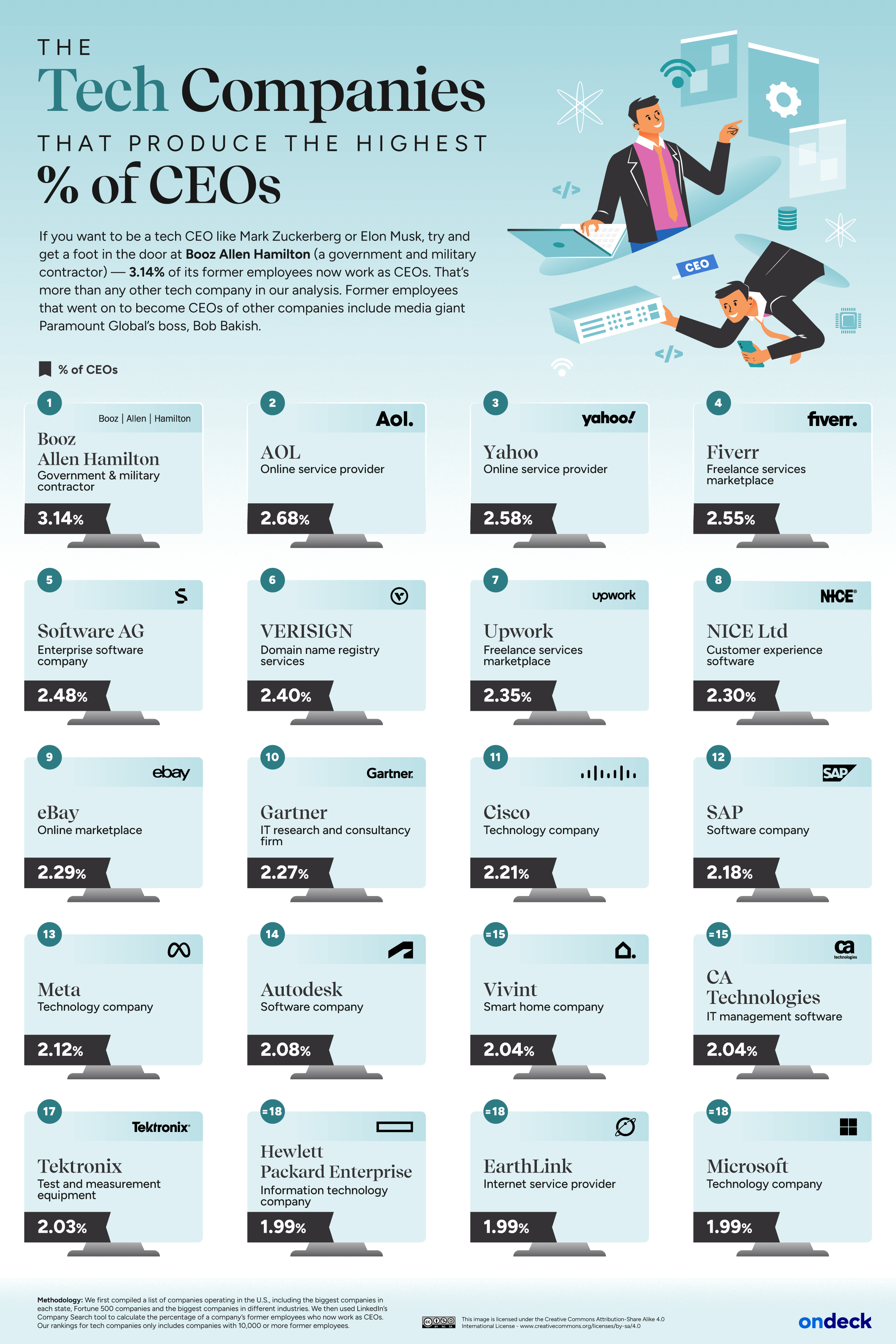
Click here to see the image in full size
Booz Allen Hamilton is a military and intelligence consulting firm and a key contractor to the U.S. government. Accordingly, employees face a rigorous recruitment and onboarding process, ensuring a talented, driven workforce right out of the box. Naturally, it doesn’t stop there: alongside working in a diverse range of high-stakes scenarios — “in defense, national security, civil, and other global industries on some of the most sensitive projects” — employees are encouraged to develop a top-down view of their working environment and to pursue leadership qualities in tandem with role-specific skills and techniques.
“At Booz Allen, you can have an impact on countless problems across a broad spectrum of clients. Most people have to change jobs numerous times to do that,” says Executive Vice President Bill Schuler. “Here, you’ll support different projects, build a powerful professional network, and parlay your successes into meaningful career advancement.”
Lazard and Goldman Sachs Are Finance’s Highest-Output CEO Factories
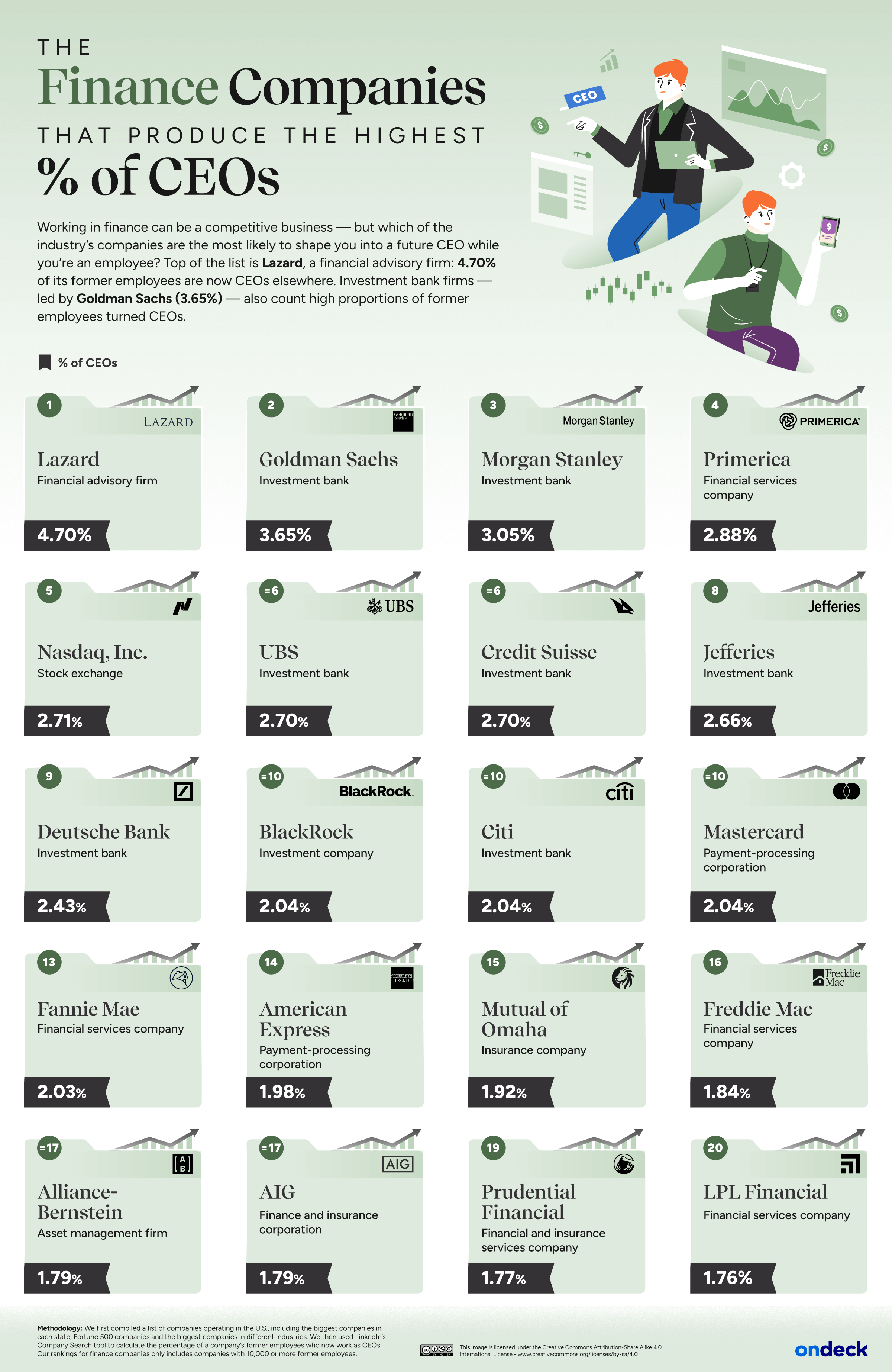
Click here to see the image in full size
Two finance industry firms are among the top 10 in our study: Lazard and Goldman Sachs. However, Lazard — a financial advisory and asset management firm — produces distinctly more CEOs than the bank Goldman Sachs.
Lloyd Blankfein is a former CEO of the latter firm. He comes from a modest background, and the company rejected his initial application. Instead, he joined them by default when they acquired the company that took him on. But Blankfein warns that CEO positions are hard to come by. “When times are tougher, you can’t leave,” he said upon his departure from the role. “And, when times are better, you don’t want to leave.”
Procter & Gamble is the “Talent Machine” of Retail
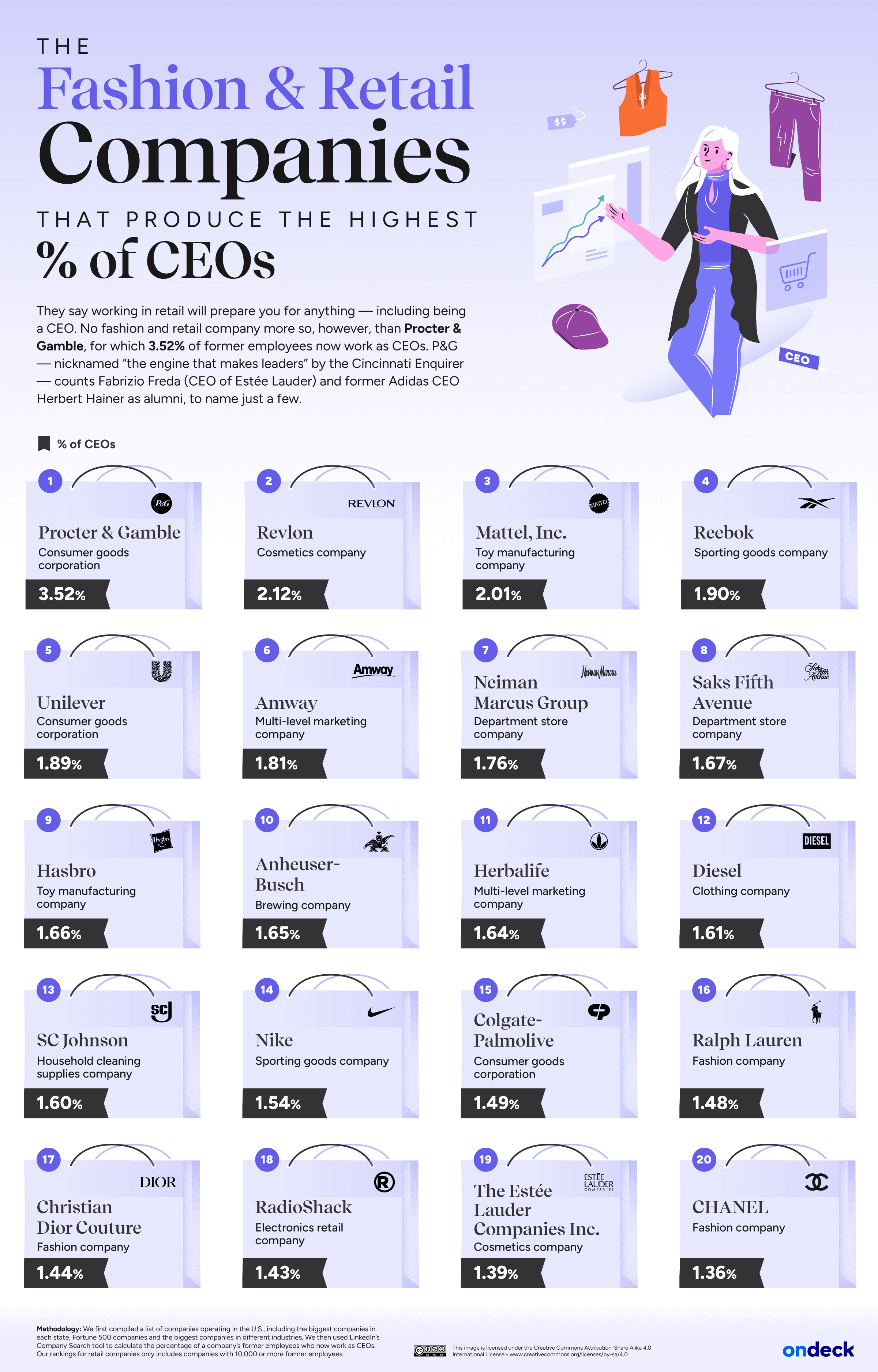
Click here to see the image in full size
Procter & Gamble leads a list of household names as the retail company that most reliably transforms employees into CEO material. Former P&G CEO A.G. Lafley tagged the company “a leadership engine and a talent machine,” noting that employees are regularly headhunted with sweeter offers.
If, traditionally, the company has forged leaders through an intensive process of intense internal competition and a disavowal of comfort zones, there are signs that this CEO factory is modernizing processes. “[O]ften our objective in meetings is to look smart, at least not look dumb, or to carry an agenda,” says current P&G CEO Jon Moeller. “If instead we went into each meeting with the objective of learning something from each person in the room, that puts you in a mindset of constant learning and growth.”
Top Music and Other Media Companies That Produce the Most CEOs on Average
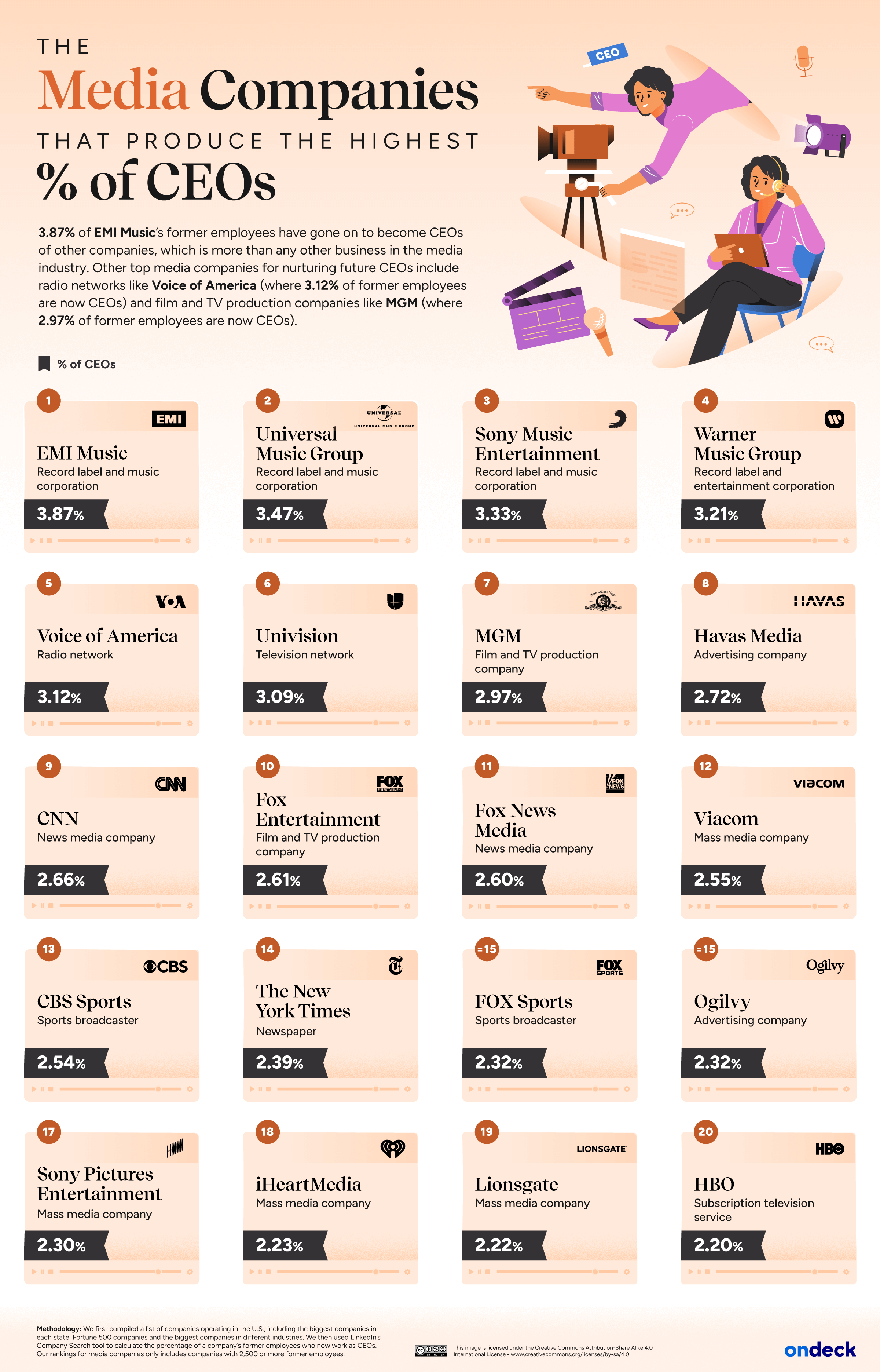
Click here to see the image in full size
On average, 2.67% of ex-employees of the media companies in OnDeck’s chart have gone on to become CEOs — the highest rate for any of the industries we surveyed. Big record labels lead the way. The diverse skill set, global perspective and creativity involved in the music industry may contribute to its strengths in developing potential CEOs.
Perhaps the music industry’s most celebrated CEO, Doug Morris, has more than fulfilled that role at three majors: Sony, Universal and Warner. But he began as a songwriter before starting his own label in 1970. “Having my own label taught me about the record business,” says Morris. “That’s where I learned about how to pay salaries, the rent, and keep the door open. You learn that when you don’t have hits, you go out of business.”
Porsche Leadership Learns from Past Mistakes

Click here to see the image in full size
The whole team at Porsche faces a steep learning curve ahead as the company transitions to electric motoring. But management gurus at the automotive industry’s top CEO factory are aware of the need to develop leadership skills that are not strictly mechanical: “The key [to leadership] is to appeal to people not only logically, but psychologically in many ways,” says Dr. Wolfgang Freibichler, a partner at Porsche Consulting — the management consultancy spun-off from the motor company in the wake of a successful restructure in the 1990s. “In other words: people forget facts, but they will always remember how they felt in a particular situation.”
The NFL is a CEO-Making Powerhouse
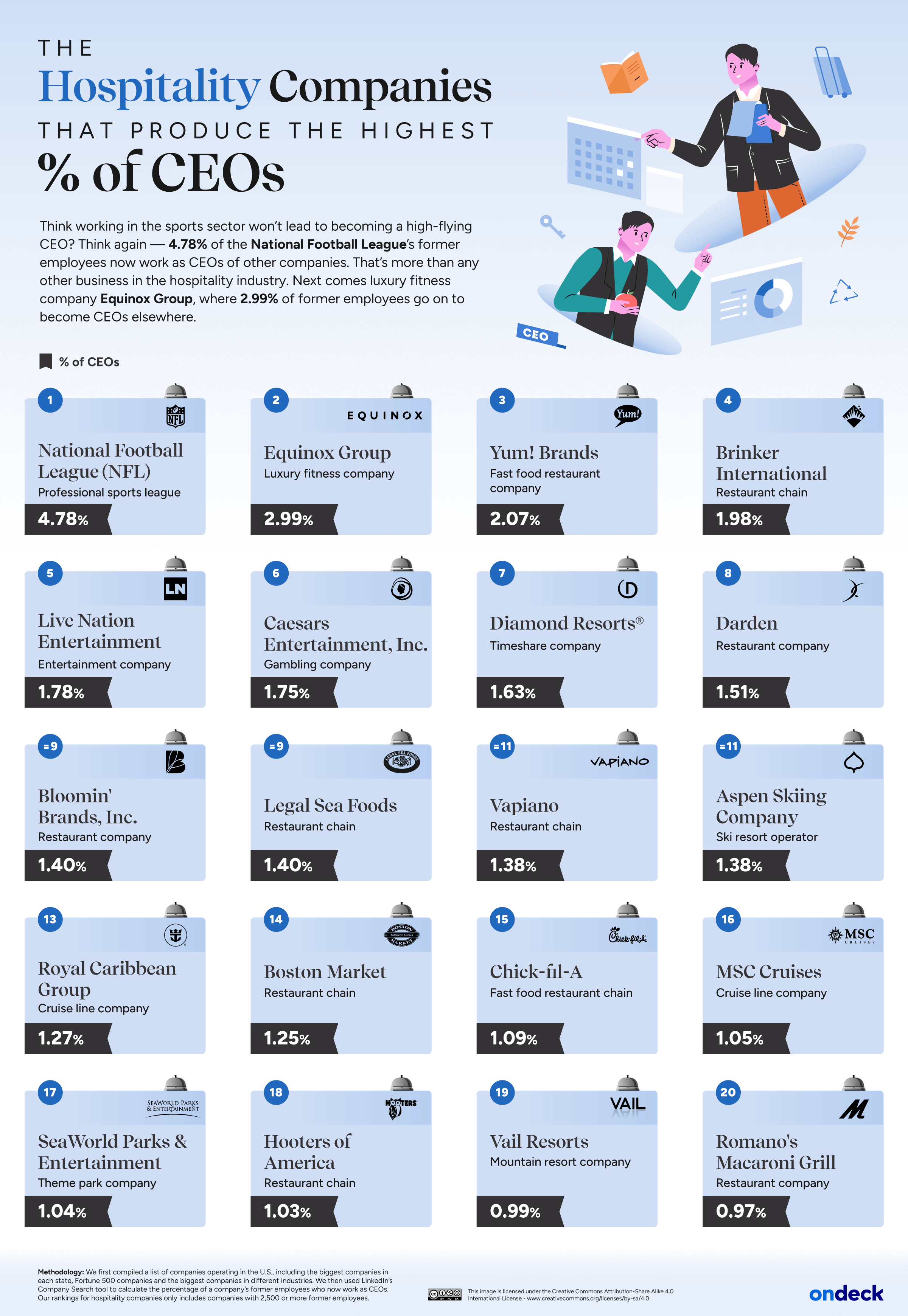
Click here to see the image in full size
Football is as much a game of strategy as of strength – it’s “a military game concerned with the conquest and the defense of territory,” according to Randall Balmer in the LA Times. Perhaps that’s why those who graduate from the NFL’s books are frequently considered CEO material. It is also what makes the NFL a delicious metaphor — and possible guiding light — for those drawn to the executive suite.
According to the write-up of an HBR study into the relative influence of the different members of an NFL franchise, “the capability to execute has become more important in the 21st century, as reflected in the increased importance of quarterbacks. When people think about performance, they often think about leaders who come up with great ideas, visions, and strategies, but they forget that value is created or destroyed by people who are “on the field” implementing those plans… We therefore believe it is critical for organizations to have strong “quarterbacks”: those coveted producer-expert-leader-managers who can drive excellence in execution.”
The CEO Experience
When Harvard Business Review discontinued its annual guide to the best-performing CEOs in 2020, it made the decision to stop “celebrating the status quo” and instead publish a richer look at how to be a great CEO — and why a more diverse leadership class can benefit everyone. Of course, part of such diversity includes an openness to social and professional backgrounds.
As the example of Doug Miller shows, while a CEO’s experience levels are among their most valuable traits, those experiences needn’t be confined to the offices of a Fortune 500 company. Rather, the value may be found in interpreting any professional experiences — whether working weekends at an independent store or starting your own small business — in terms of its implications for a company’s profitability and culture.
However, if you’re looking to become one of those who emerges from the ranks of one big company to lead another as CEO, please browse our full data below to identify the most appropriate places to apply.
METHODOLOGY & SOURCES
We first compiled a long list of companies operating in the U.S. using sources from Zippia.com and Niche.com, including the biggest companies from each state, Fortune 500 companies and the biggest companies from the industries of technology, media, finance, retail, automotive and hospitality.
We then used publicly available data via LinkedIn’s Company Search tool to record the number of workers who used to work at these brands vs. the number of former workers who are now CEOs. This allowed us to calculate the percentage of CEOs for each company.
Our final rankings of companies that produce the most CEOs in general and within tech, finance and retail only include U.S. companies with 10,000 or more former employees. Our rankings of the same metric within media, automotive and hospitality only include companies with 2,500 or more former employees.
The data for this research was gathered as of August 2023.
DISCLAIMER: This content is for informational purposes only. OnDeck and its affiliates do not provide financial, legal, tax or accounting advice.



